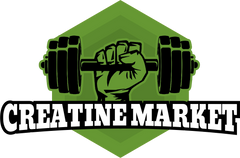Creatine is widely recognized as one of the most effective and well-researched supplements in the fitness industry. This comprehensive guide will explore how creatine works, its benefits, potential side effects, and proper usage guidelines.
What Is Creatine?
Creatine is a naturally occurring compound found in muscle cells that plays a crucial role in energy production. Your body produces about 1-2 grams of creatine daily in the liver, kidneys, and pancreas. Additional creatine comes from dietary sources, primarily meat and fish.
If you're wondering whether creatine supplementation is right for your fitness journey, our detailed Creatine Beginner's Guide. This guide is aimed at beginners, and can help you make an informed decision when it comes to using creatine products.
How Creatine Works
Creatine functions by increasing phosphocreatine stores in your muscles. This molecule helps form ATP (adenosine triphosphate), your body's primary energy source for quick, explosive movements. When your muscles need energy, phosphocreatine quickly donates its phosphate group to ADP, forming ATP for immediate energy use. With more stored phosphocreatine, you have more available energy, enabling higher intensity exercise.
Proven Benefits of Using Creatine
Research has consistently demonstrated creatine's effectiveness for muscle growth and strength. Users typically experience increased muscle fiber growth, improved protein synthesis, and enhanced muscle recovery, leading to significant improvements in maximum strength and lean mass gains.
Athletic performance sees notable improvements through creatine supplementation. Athletes report better high-intensity exercise capacity with enhanced power output and sprint performance. The supplement also helps reduce fatigue during repeated efforts and supports faster recovery between sets.
Beyond physical performance, creatine offers several additional advantages. Studies indicate it supports brain health and cognitive function while showing promise for managing neurological conditions. It's particularly valuable for vegetarians who might not get enough creatine through their diet, and research suggests it can contribute to improved bone strength, especially in aging populations.
Creatine Side Effects and Management
Most users experience minimal side effects with creatine supplementation. The most common effect is initial water retention, which typically results in a weight gain of 2-4 pounds. Some people might experience mild digestive discomfort or muscle cramping, particularly if not staying properly hydrated.
Managing these effects is straightforward: maintain proper hydration, start with standard doses rather than loading, and consider taking creatine with meals to minimize any digestive issues. Most side effects resolve as your body adjusts to supplementation.
How to Use Creatine
The standard recommended dose is 3-5 grams daily, though some choose to begin with a loading phase of 20 grams daily for 5-7 days to saturate muscles more quickly. After any loading phase, users should maintain consistent daily dosing. Creatine can be taken any time of day, though it's best absorbed when taken with carbohydrates.
While several forms of creatine exist on the market, creatine monohydrate remains the most studied and typically most cost-effective option. Other forms include creatine HCL, ethyl ester, and buffered creatine, though research hasn't shown significant advantages over the monohydrate form.
Safety Considerations
While creatine is generally safe for healthy individuals, certain groups should exercise caution. People with kidney problems, diabetes, or those who are pregnant or nursing should consult healthcare providers before starting supplementation. Anyone taking prescription medications should also discuss potential interactions with their doctor.
Performance Expectations
Users typically notice initial effects within the first week, primarily due to increased muscle hydration. Short-term results include improved workout capacity and better between-set recovery. Long-term benefits develop over weeks and months, including sustained strength gains, muscle mass development, and enhanced overall athletic performance.
Choosing Quality Creatine Products
When selecting a creatine supplement, prioritize products from reputable manufacturers that undergo third-party testing. Compare price per serving rather than package price, and look for purity guarantees. While premium products might cost more, the difference in quality often justifies the investment.
Optimizing Your Results From Taking Creatine
Success with creatine supplementation relies on several key factors. Maintain consistent daily intake rather than cycling on and off. Combine supplementation with proper resistance training and nutrition. Stay well-hydrated and give the supplement adequate time to work – most users see optimal results after 2-4 weeks of consistent use.
Conclusion
Creatine stands as one of the most effective and well-researched supplements available. When used properly, it offers significant benefits for muscle growth, strength, and athletic performance with minimal risk of side effects. Understanding how it works and following proper usage guidelines can help you maximize its benefits while maintaining safety.
Remember that while creatine is highly effective, it works best as part of a comprehensive approach to fitness that includes proper nutrition, consistent training, and adequate rest. Whether you're an athlete looking to enhance performance or someone interested in improving their fitness results, creatine can be a valuable addition to your supplementation routine.




